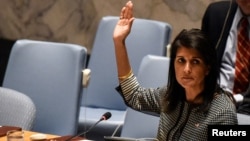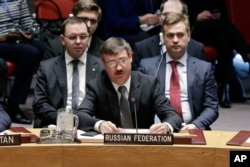U.S. Ambassador to the U.N. Nikki Haley has admonished the warring parties in South Sudan, saying they have done nothing to end the suffering of their people and are only exacerbating it.
Haley spoke of the on-going violence, worsening food insecurity, massive displacements, and the dangers to humanitarian workers in the young but failing country.
“It is clear that the warring parties do not have the political will to end this conflict on their own, and so it falls on us to consider our next steps carefully and without any illusions,” she told fellow Security Council members.
U.S. urges council to act
In March, the council issued a strong statement calling on the government of President Salva Kiir and the opposition of Riek Machar to immediately adhere to a permanent cease-fire; provide safe and unimpeded access for humanitarian workers across the country; and to stop obstructing the U.N. peacekeeping mission.
“As we meet here today, none of these steps have been taken,” Haley said. “Not one.”
“I call on this council to move forward with the tools available to it, such as with further sanctions, an arms embargo, or the violence and the atrocities will continue,” the American envoy said. “We must not wait for more deaths, more displacement and more destruction before we have the courage to act.”
But it was not clear that the council would move ahead on a long-threatened arms embargo or further sanctions. A vote for both failed in December, with only seven votes in support of the measure and eight council members abstaining.
Russia opposes action
On Tuesday, veto-wielding council member Russia reiterated it remains opposed to such action.
“Our position regarding a ramping up of Security Council sanctions against South Sudan has not changed,” acting U.N. Ambassador Petr Iliichev told the council. “Sound peace in South Sudan will not be brought about by a Security Council arms embargo, but by targeted measures to disarm civilians and demobilize and reintegrate combatants,” he said.
The Chinese envoy also sounded a reticent tone, saying any council action must be cautious and conducive to promoting the political process and mediation efforts.
Worsening situation
But as the council ponders what to do to force the warring parties to lay down their weapons, the situation continues to grow more dire by the day.
Violence has intensified in the past month, adding to the nearly two million people already displaced inside the country, while tens of thousands more flee South Sudan for its neighbors.
More than 5.8 million people require humanitarian assistance and famine has been declared in two counties affecting 100,000 people, while a million more remain on the brink of it. Aid workers try to reach them despite obstacles and great danger. In the past month, there have been three attacks on aid workers, killing 10 people.





